Prioritizing Business Savvy
Saburo Kawabuchi has come to epitomize the successful athlete-turned-administrator, most notably for guiding soccer into a top professional sport as J. League’s first chairman. The league’s popularity skyrocketed under his leadership, but the going was by no means easy.
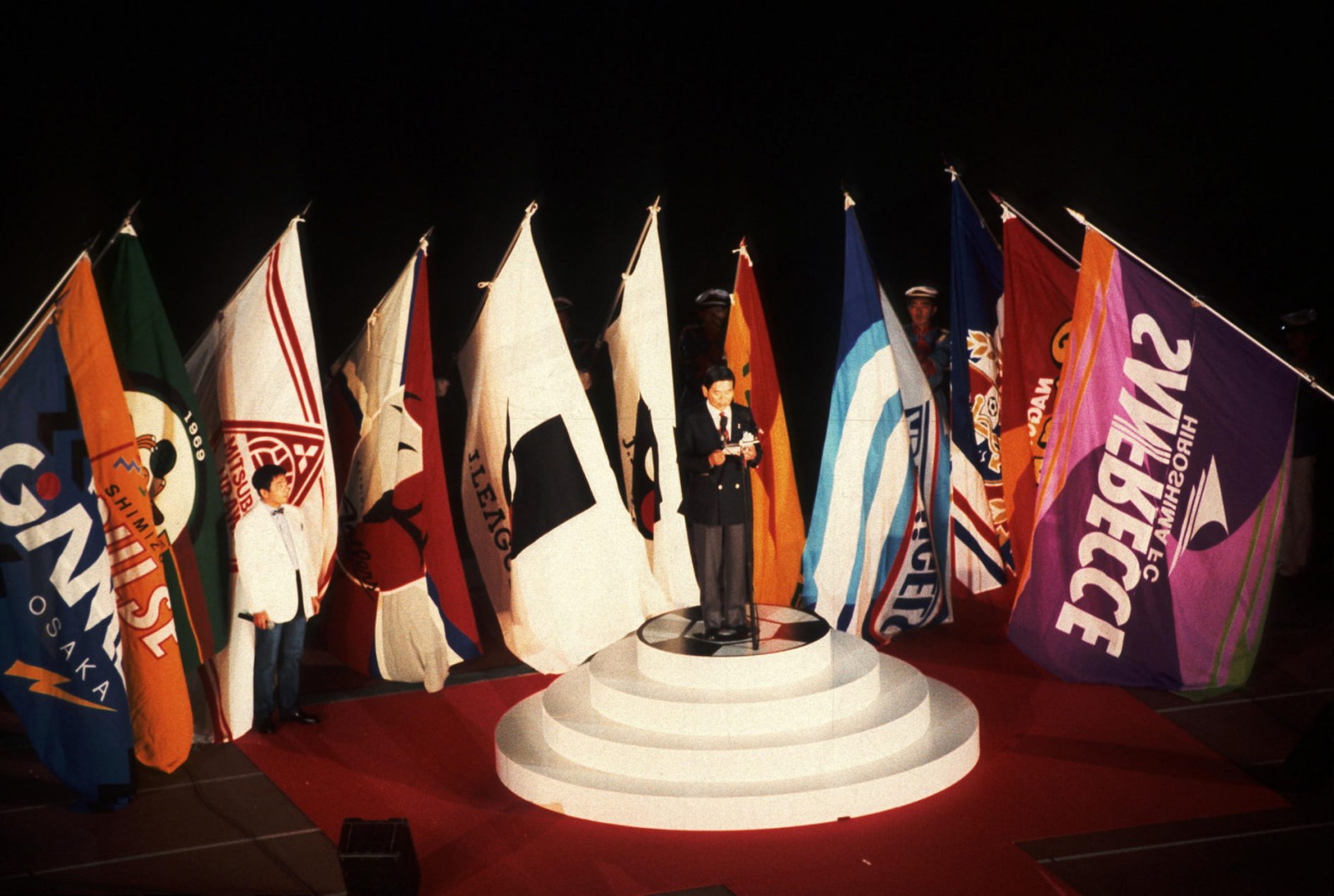
Saburo Kawabuchi declares the highly anticipated launch of J. League’s inaugural season at the National Stadium in May 1993. ©Photo Kishimoto
“When professional soccer was launched in Japan in the early 1990s, the chief executives of most teams were board members of the corporate owners.” Kawabuchi recalls. “Very few, I must say, had any inkling of how to run a sports team as a business. It wasn’t until [Rakuten founder and CEO] Hiroshi Mikitani took over as chairman of Vissel Kobe that we began seeing big-time deals. Vissel acquired Andrés Iniesta,” considered one of the best midfielders of all time, “and negotiated a collaboration agreement with FC Barcelona. With other clubs, too, starting to show more business savvy, I think the future of soccer in Japan is looking brighter.”
After stepping down as J. League chairman, Kawabuchi remained a driving force for robust sports management, helping unify Japan’s fragmented professional basketball leagues as president of the Japan Basketball Association and spearheading the establishment in 2015 of the Japan Top League Alliance among 12 leading ball-game associations.
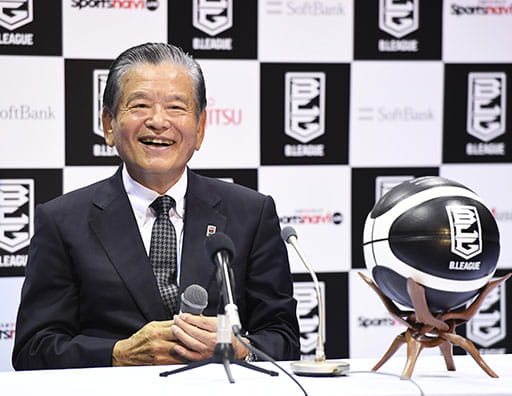
Kawabuchi continues to promote the interests of ball game organizations as president of the Japan Top League Alliance. ©Photo Kishimoto
“Most sports associations have very detailed plans about developing their own sport and training world-class athletes, both over the short and long term. But my feeling is that those plans don’t pay enough attention to the business side of sports management. The biggest challenge is securing human resources to come up with innovative ideas and business models. Attracting talented people takes money, of course, which most athletic organizations can’t spare at the moment. This is leading to a vicious cycle of a lack of capable personnel and a further erosion of management competence. The only way out of this negative spiral is to prioritize business skills over knowledge of the sport.”
Helping Build Vibrant Communities
Yuko Mitsuya, a former volleyball middle blocker and a bronze medalist at the 1984 Los Angeles Games, succeeded Saburo Kawabuchi as president of the Japan Basketball Association. Today, she is a management expert actively engaged in a broad range of fields, from developing the next generation of sports leaders to serving as an executive at various sports organizations and on a number of corporate boards.
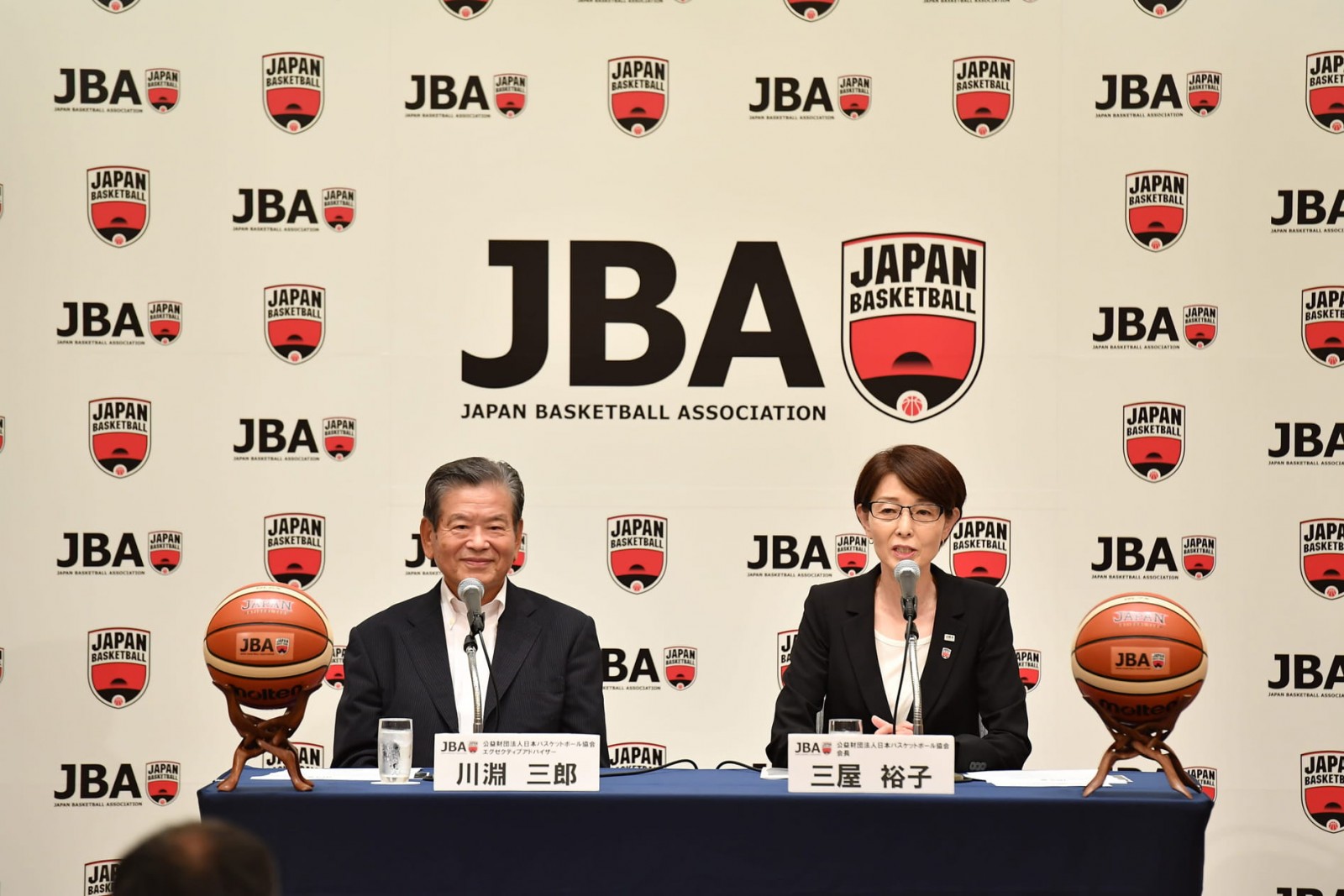
Yuko Mitsuya, right, at a press conference after being named to succeed Kawabuchi, left, as president of the Japan Basketball Association. ©Japan Basketball Association
“By the time I began playing volleyball, it had already become a major sport in Japan,” says Mitsuya. “The level of play in Japan was quite high by global standards, and this allowed me to set my sights on playing at the top ranks of international competition. What struck me when I became president of the Japan Basketball Association, on the other hand, was that players had no sense of being among the world’s best. The number of JBA-registered basketball players is around 630,000, though, which is higher than any other sport except baseball and soccer. So, I knew basketball had great potential in this country.”

The opening ceremony for the professional B. League season in 2016 was a spectacular event featuring an all-LED court and some of Japan’s largest digital displays. ©Photo Kishimoto
Mitsuya strongly believes that the focus of sports management should be expanded to include not just developing top athletes but also contributing to the local community.
“This is a topic I often discussed with my professors when I was studying coaching science at the University of Tsukuba’s graduate school. My view is that given Japan’s declining birthrate, the primacy of a school-centered sports policy will decline over the long term, so we’ll need to expand our focus to include the community as well. Sports has traditionally been associated with promoting healthy development among youth, but from now on, it should also be offered in the community to help maintain good health among older people.
“We’ll also need to demonstrate through concrete examples how sports can contribute to the building of vibrant communities in the face of an aging and dwindling population. To attract younger people, in particular, communities will need to offer venues for sports events and opportunities to pursue lifestyles that includes time for athletic and other recreational activities.
“I believe that Tokyo 2020 will become an important legacy in advancing sports-centered community building, and I hope to be actively engaged in promoting such initiatives going forward.”
The Power to Inspire
Another highly prominent athlete-turned-administrator is Daichi Suzuki, gold medalist in the 100-meter backstroke at the 1988 Seoul Games. After retiring from active competition, he became the youngest-ever chair of the Japan Swimming Federation and was subsequently appointed inaugural commissioner of the Japan Sports Agency when it was established as part of the Ministry of Education, Culture, Sports, Science, and Technology in October 2015.
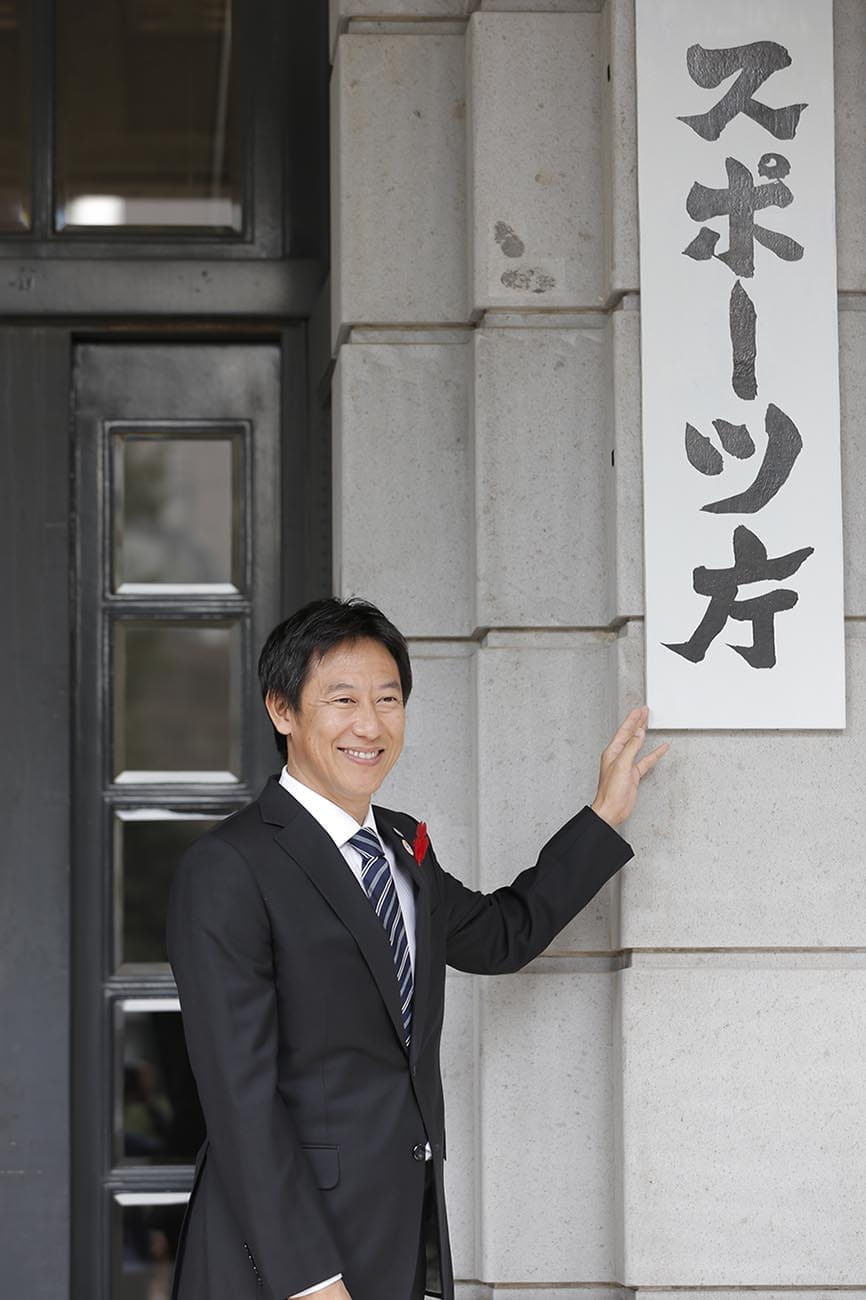
As inaugural commissioner of the Japan Sports Agency, Daichi Suzuki promoted a variety of policies aimed not just at developing top athletes but also enhancing sports participation in the community, including by people with disabilities. ©Photo Kishimoto
“I think government support is important,” says Suzuki, who has now returned to the Japan Swimming Federation as its chair, “but ultimately, sports organizations need to become more self-reliant, partly because government funds could taper off over the long run. Sports, after all, is a matter of personal choice, so it should ideally generate enough income to build most of the necessary infrastructure on its own, seeking public help only when needed. That said, you’re not going to find too many former athletes, coaches, and educators with a strong business mindset. So, our best bet would be to partner with people who have marketing expertise to grow sports as a business.
“When you think about the huge role sports has historically played in our lives,” Suzuki notes, “I can’t help but feel that it’s capable of doing much more to inspire people and change society for the better. One good example was Japan’s triumph in the 2011 FIFA Women’s World Cup, just months after the devastating Tohoku earthquake and tsunami in March. This was an incredible source of encouragement for people in the affected areas. There are countless other examples, both tangible and intangible, of how sports can provide the impetus for a fuller, more robust life.
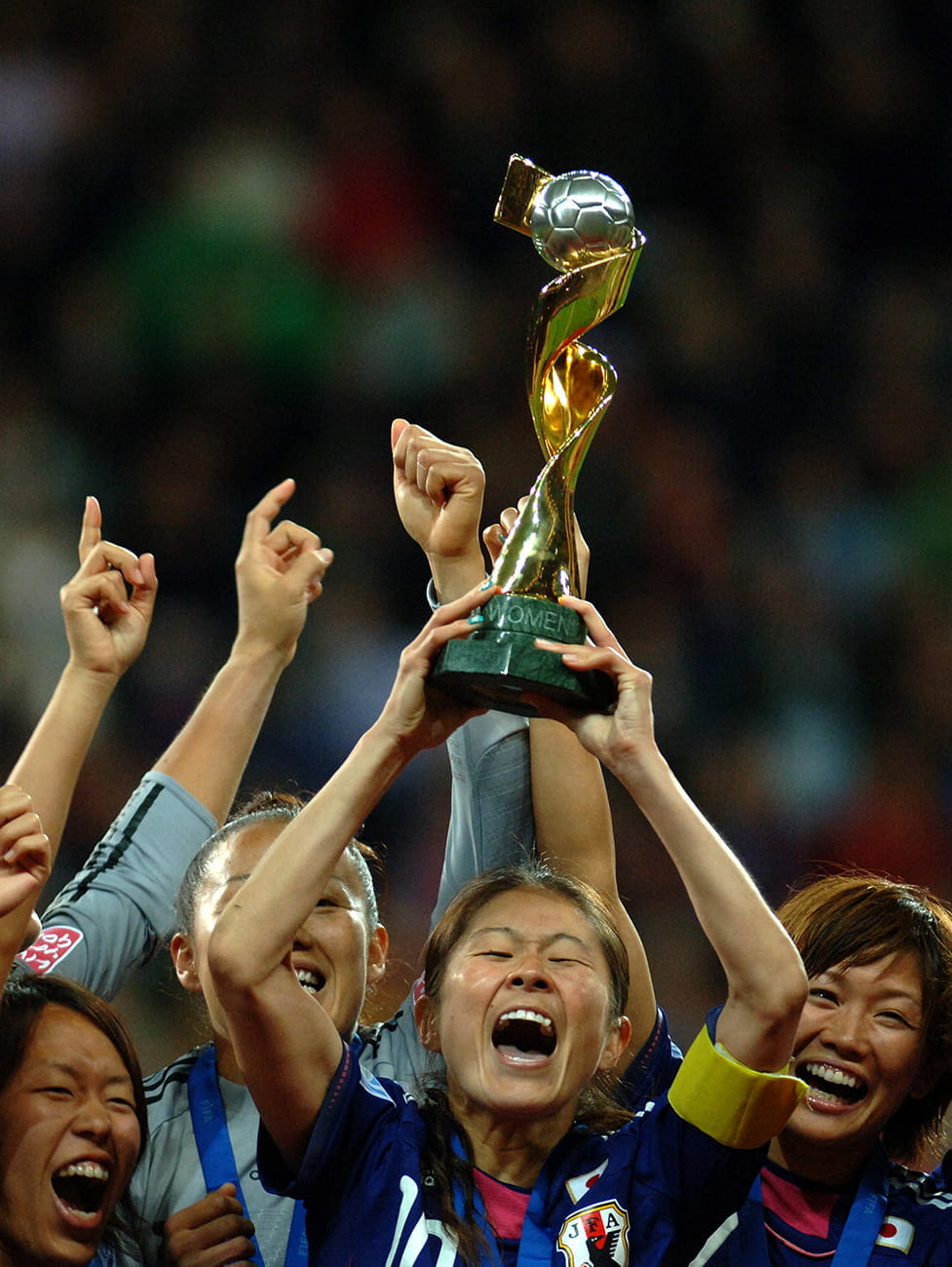
Japan’s victory at the 2011 FIFA Women’s World Cup in July, just months after the Tohoku earthquake, was a source of great encouragement and inspiration. ©Photo Kishimoto
“Sports is so much more than just winning medals at prestigious tournaments. It provides sustenance for the body and soul, and the lessons learned can be carried over into one’s business career. Renowned athletes who continue to engage with and contribute to society following retirement can play a particularly valuable role in communicating the benefits of sports to the general public.”
Comments by the speakers translated from excerpts of separate interviews conducted in Japanese on September 30, 2019 (Saburo Kawabuchi), February 2, 2017 (Yuko Mitsuya), and July 14, 2016 (Daichi Suzuki).






